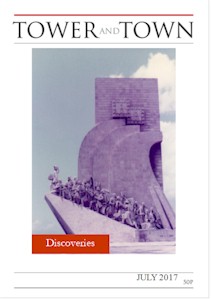

Tower and Town, July 2017 (view the full edition) (view the full edition)Discovering Forced MigrationEarly this year I came across an invitation to go to a Quaker conference about forced migration. It was to be at the Woodbrooke Quaker centre in Birmingham in February. I'd never been there and knew nothing about forced migration, beyond the often disparaging views about migrants and refugees in the popular press. An opportunity to find out about two new things in one weekend! Woodbrooke proved to be one of several such centres I've known. A well run spacious place in lovely grounds offering stimulating courses, with time and facilities to reflect, as well as opportunities to learn and for discussion and challenge. It has a pleasing simplicity and caring staff. In the 1940s and 50s refugees were identified with the huge number of people made homeless and without country by the horrors of the Second World War. Now in the UK, 'refugees' are only those we have agreed to allow to live here for 5 years. They then have to re-apply to be allowed to stay longer. We have coined new words for the un-accepted: 'asylum seekers' allowed a minimum of subsistence, sometimes with housing provided by Government, but usually not allowed to work until their plea is decided. 'Refused asylum seekers' awaiting deportation or the results of an appeal. They are not allowed to work, are denied benefits and have no access to housing or health care. The process of seeking asylum is very tough. Application has to be made in person. There is no right to legal help for appeals. Papers have to be in order and the case presented in the right words. Yet many applying have fled their homeland in fear, have been a long time in difficult conditions and have limited understanding both of the process and of our language. A strict process is necessary, but does that have to mean one that is tough to the point of inhumanity; one that so distresses both asylum seekers and, I'm sure, those administering the system? There were many examples of such treatment within the process given at the conference. A way to see this is to look, not at individual stories, but at what work is being done in alleviation by voluntary organisations: help with such things as: Accommodation Weekly money Accompanying to appointments Advocacy, help with solicitors, medical treatment, Home Office reporting requirements etc. Interpreters Treatment for trauma and stress Childcare. Locally, a good example of this is the Harbour Project in Swindon. What I came to think, over my weekend at Woodbrooke, is that we all need more understanding of what is being done in our name. We need to consider whether the system, is, in the end, counter-productive because of its side effects. Poverty drives some to crime. Disillusion and bitterness are a discouragement to having a positive view of Britain. Costs of psychiatric care and in long running appeals (around one-third of which are successful) take money from actions to help. People, especially children, living for so long in such uncertainty and with so many difficulties become very disturbed. Can we do better? It won't be easy and there's not likely to be a single solution. But one good hope is the Syrian refugee programme. Under this programme people are selected in or near their home country. They are admitted as refugees. Local authorities provide housing and school places and for five years at least they have some security. Thank goodness Wiltshire and Swindon are involved in this. Patrick Titman |